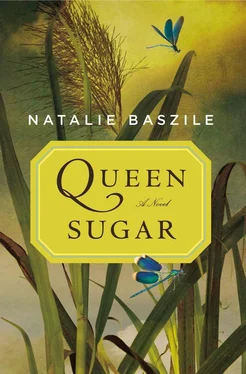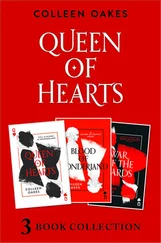• • •
The gently rolling hills and golden pastures dotted with hay bales and the wide dry riverbeds of the East Felicianas looked nothing like the south Louisiana Charley had come to know, and as she crossed into the parish, northeast of Saint Josephine and an hour’s drive from Baton Rouge, her eyes drank up the scenery. She followed the country road through Slaughter, where the ragtime legend Buddy Bolden lived before he moved to New Orleans and lost his mind, and less than an hour from the Mississippi state line, she stopped at the gas station in Clinton and bought a Coke, then sat in her car for a long time, watching people come and go from the courthouse in the tidy town square. The courthouse, made in the Greek Revival style and painted a crisp, gleaming white, matched the row of lawyers’ offices across the street, their columns looking like matchsticks, the way they lined up so perfectly. The whole town looked like a picture postcard, Charley thought, so serene and unblemished, having never been touched by the storm; nothing at all like the wreckage she’d left behind in Saint Josephine. Why was it that some places had escaped nature’s wrath while her small corner of the world seemed constantly tormented by misfortune? It didn’t seem fair.
When Charley finished her Coke, she checked her watch — almost three o’clock, which meant it was almost one o’clock in Los Angeles. She took out her cell phone and dialed her mother’s number.
Lorna answered on the first ring. “Charlotte?”
Charley heard glasses clinking in the background, silverware tapping delicately against bone china plates, the echoey voice of a woman speaking into a microphone followed by applause, and guessed that her mother was at a fund-raising luncheon for one of her charities. Until that moment, Charley had decided, stubbornly, not to call, reminding herself every time she was tempted that her mother had mocked her decision to move to the South. But Lorna’s voice was like warm milk, and hearing it now, all of Charley’s defenses and justifications fell away and all the rawness she’d worked so hard to ignore came right to the surface. Her eyes filled immediately with tears, her chest tingled with a silvery tightness, and just like that, she was five years old again, aching to be held and comforted.
Charley took a deep breath and wiped her eyes. “Hi, Mom.”
“Where are you? Where’s Micah? I’ve been watching the news. Please tell me you’re okay.”
“We’re all fine,” Charley said, thinking nothing could be less true, and heard Lorna sigh with relief. “John boarded up Miss Honey’s windows, which I think made all the difference.” She went on for a few minutes, but at some point it seemed pointless trying to describe what the hurricane had been like. It wasn’t something you could sum up with words. It was like Mr. Denton said, you had to live it.
“Well, I’m glad you’re okay,” Lorna said. “I was worried. People here have been asking and I didn’t know what to tell them,” which Charley understood was Lorna’s way of chiding her for not calling.
“I’m sorry,” Charlie said. “I should have called before now. It’s just I’ve been so busy since we got here. There’s so much to do. But you can tell everyone we’re fine. A little shaken and there’s a lot to clean up, but I think we were lucky.”
“That’s very good,” Lorna said. “I’m so relieved, because from here the news reports looked so frightening — all that rain, and the flooding, goodness. I really can’t imagine.”
“I know,” Charley said, and swallowed against the tightening she felt in her throat. She pictured her fields, which looked like nothing more than a big brown pond now with the cane stalks barely poking through. “You have to see it to understand.”
There was a long pause, which seemed to stretch out endlessly, and as she searched for something to say, Charley mourned that things between her and her mother had become so awkward and strange. The whole conversation made her feel antsy and agitated, as though she were trying to fit into a sweater whose sleeves were tight.
“And how are you, Mom?” Charley said, finally. “How’ve you been?”
“Oh, Charlotte, you know me. I always have a thousand things on my plate. Busy, busy, busy, all the time.”
“That’s good.”
“As a matter of fact, I’m at a function right now.”
“Yes,” Charley said. “I can hear.”
When she dialed her mother’s number, Charley had not planned to ask for a loan — not exactly. She’d only wanted to hear her mother’s voice and feel a little bit of the warmth she’d felt when she was young enough to sit on her mother’s lap. Had she hoped her mother would ask about the farm? Yes, she had, and maybe even offer to help. But it seemed Lorna had no intention of asking or offering anything.
“Actually, things aren’t good,” Charley said. “I’ve had a setback on the farm. The hurricane flattened everything. My crop is probably ruined, three of the four quadrants, anyway, and Mr. Denton — that’s my manager, I don’t know what I’d do without him — anyway, Mr. Denton says even if we’re lucky enough to salvage a few acres, we’ll need additional capital to make it to grinding. Even more than we needed before.” Charley paused.
“My goodness, listen to you,” Lorna said. “Quadrants? Capital? Grinding? Good heavens, Charlotte, you sound like a real farmer.”
“I guess I do,” Charley said, and felt a small burst of warmth spread over her. “I told Mr. Denton I’d find the money, and I wondered — you know I wouldn’t ask if I weren’t desperate — but I wondered if you’d help me. I need a hundred and two thousand dollars total, but I’ll take whatever you can spare.”
Charley waited.
“My goodness, dear, that’s an awful lot of money.”
“Yes, it is.” Charley thought of her father. He’d always told her she should never make assumptions about other people’s time or their money, and that’s the way she’d tried to live. The moment she asked her mother, she regretted it, but the question was out there now. “It would be a loan, not a gift.”
“I’ll take Micah,” Lorna said, finally.
“You’ll what?”
“Send Micah to me. That way you can focus all your attention on your farm without distraction. You can get a second job without worrying who’ll take care of her.”
In the late-afternoon sun, the courthouse cast off warm yellow light and looked even more stately than it had an hour before, with the row of columns throwing long shadows across the grass and the sky blue as a robin’s egg. The air was warm and the breeze carried with it the faint fragrance of willow and pine.
“That’s very generous of you,” Charley said, biting back tears, “but Micah’s fine right here.”
“Very well,” Lorna said, “but if you change your mind, you know I’ll always take her.”
Through the receiver, Charley heard another round of applause and the clatter of dishes being cleared. “I should let you get you back to your lunch.”
“Yes,” Lorna said. She sighed again, and Charley pictured her sipping coffee from the china cup, her lips barely touching the rim. “I almost forgot,” Lorna said, “I sent Micah a party dress. You can tell her it’s an early Christmas present. I hope it fits.”
“I’m sure it will. I’ll make sure she calls when it arrives.”
“Very well,” Lorna said. “I’m glad you called. And don’t worry, Charlotte, you’re resourceful, just like your father. I know you’ll figure out something.”
• • •
The loan officer at First Bank of Baton Rouge had hair plugs, and Charley, sitting at the corner of his desk in his padded cubicle, couldn’t stop staring at the fine hairs, like chick fuzz, and the constellation of tiny punch holes laid out in even rows. The irony of the situation was not lost on her, and she almost laughed out loud because there was as much chance those plugs would take as there was of her getting the loan. Charley knew, because this was the tenth loan she had applied for in the last two days; the tenth time she’d sat across from a loan officer in a bad suit and pleaded her case, and it would likely be the tenth time she would be turned away.
Читать дальше












